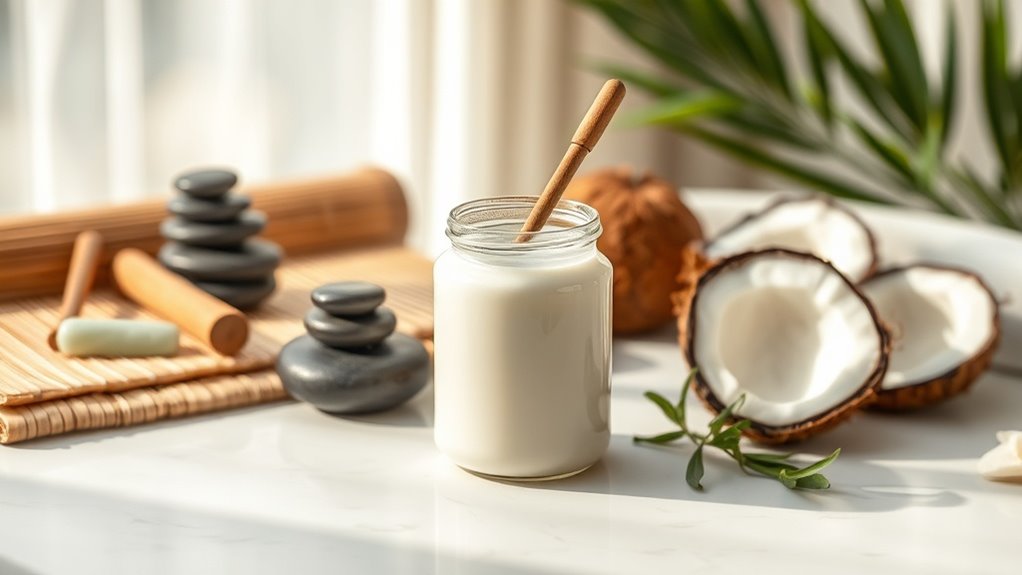Kidney Stone Remedies to Support Relief Naturally
One in ten people will experience kidney stones during their lifetime, making them a common yet painful urological condition. If you’re dealing with kidney stones, you’ll find various natural remedies that can support relief and potentially prevent future occurrences. While medical intervention is sometimes necessary, understanding effective natural approaches – from specific dietary changes to time-tested herbal solutions – can help you manage symptoms and reduce your risk of recurrence.
Understanding Kidney Stones and Their Symptoms
Kidney stones are hard deposits that form within your kidneys when minerals and salts crystallize and bind together.
These crystalline masses can cause severe discomfort as they move through your urinary tract. You’ll likely experience sharp pain in your back, side, or lower abdomen, often accompanied by nausea and vomiting.
Common symptoms include blood in urine, cloudy or foul-smelling urine, and frequent urination.
While seeking kidney stone remedies, you might notice pain that radiates to your groin area and a burning sensation when urinating.
The intensity of symptoms typically depends on the stone’s size and location within your urinary system.
Essential Hydration and Dietary Changes
How you manage your fluid intake and diet plays an essential role in both preventing and treating kidney stones.
You’ll need to drink 8-12 glasses of water daily to maintain clear, light-colored urine. Limit sodium to 2,300mg daily and reduce animal protein consumption to 6 ounces per day.
For calcium oxalate stones, you should moderate your intake of oxalate-rich foods like spinach, nuts, and chocolate.
However, don’t reduce dietary calcium, as this can increase stone formation. Instead, pair calcium-rich foods with oxalate-containing meals to help bind oxalates in your digestive tract before they reach your kidneys.
Herbal Remedies for Kidney Stone Relief
While scientific evidence varies, several herbal remedies have shown promise in managing kidney stone symptoms and supporting stone passage. You’ll find potential relief using basil, which contains acetic acid and compounds that may help break down stones.
Celery seed extract can increase urine output, while pomegranate juice offers antioxidant properties that might prevent stone formation.
Consider drinking nettle leaf tea for its diuretic effects and anti-inflammatory properties. Dandelion root and chanca piedra (“stone breaker”) have demonstrated effectiveness in traditional medicine for dissolving and preventing kidney stones.
Always consult your healthcare provider before starting any herbal treatment regimen.
Beneficial Lifestyle Modifications
Beyond herbal treatments, making targeted lifestyle changes can greatly impact kidney stone management and prevention.
You’ll need to maintain proper hydration by drinking 2-3 liters of water daily, which helps dilute stone-forming minerals in your urine.
Reduce sodium intake to below 2,300mg per day and limit animal protein consumption to decrease uric acid levels.
Regular exercise supports healthy kidney function and helps maintain ideal body weight.
Additionally, you should moderate your intake of oxalate-rich foods like spinach and nuts, while increasing your calcium consumption through low-fat dairy products.
Natural Pain Management Techniques
When kidney stone pain strikes, several natural techniques can provide relief without pharmaceutical intervention.
Apply a heating pad to your lower back or take a warm bath to relax tense muscles and increase blood flow.
Practice deep breathing exercises or meditation to manage pain responses. Gentle stretching and yoga poses like child’s pose can ease discomfort.
Stay hydrated with water and herbal teas containing anti-inflammatory properties, such as ginger or chamomile.
Try acupressure by applying firm pressure to specific points on your body, particularly the area between your belly button and pubic bone.
Foods and Supplements That Support Kidney Health
Proper nutrition and supplementation play a direct role in preventing kidney stones and maintaining ideal renal health. You’ll want to focus on foods rich in citrate, magnesium, and potassium while limiting sodium and animal protein intake.
| Nutrient | Food Sources | Benefits |
|---|---|---|
| Citrate | Lemons, Limes, Oranges | Prevents crystal formation |
| Magnesium | Pumpkin seeds, Spinach | Reduces oxalate absorption |
| Potassium | Bananas, Avocados | Lowers calcium excretion |
| B6 | Sweet potatoes, Fish | Reduces urinary oxalate |
Consider supplements like vitamin B6, magnesium citrate, and potassium citrate after consulting your healthcare provider, as they’ve shown effectiveness in stone prevention studies.
When to Seek Medical Attention
Although many kidney stones can pass naturally, certain symptoms require immediate medical evaluation. You should seek emergency care if you experience severe, persistent pain that doesn’t improve with over-the-counter medication.
Other warning signs include fever above 101.5°F, chills, vomiting, bloody urine, or difficulty urinating.
Contact your doctor immediately if you notice signs of infection, including cloudy or foul-smelling urine. If you’re unable to keep down fluids or medications due to nausea, or if you have a history of kidney problems, don’t wait to get medical help.
Delayed treatment can lead to serious complications.




